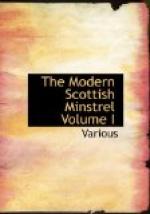Dialogue on Scottish Music,” prefixed, had the
merit of conveying to Continental musicians for the
first time a correct acquaintance with the Scottish
scale, the author receiving the commendations of the
greatest Italian and German composers. The work
likewise contains “Songs of the Lowlands,”
a selection of some of the more interesting specimens
of the older minstrelsy. In 1802 he published
“A Tour from Edinburgh through various parts
of North Britain,” in two volumes quarto, illustrated
with engravings from sketches executed by himself.
This work met with a favourable reception, and has
been regarded as the most successful of his literary
efforts. In 1804 he sought distinction as a poet
by giving to the world “The Grampians Desolate,”
a long poem, in one volume octavo. In this production
he essays “to call the attention of good men,
wherever dispersed throughout our island, to the manifold
and great evils arising from the introduction of that
system which has within these last forty years spread
among the Grampians and Western Isles, and is the leading
cause of a depopulation that threatens to extirpate
the ancient race of the inhabitants of those districts.”
That system to which Mr Campbell refers, he afterwards
explains to be the monopoly of sheep-stores, a subject
scarcely poetical, but which he has contrived to clothe
with considerable smoothness of versification.
The last work which issued from Mr Campbell’s
pen was “Albyn’s Anthology, a Select Collection
of the Melodies and Vocal Poetry Peculiar to Scotland
and the Isles, hitherto Unpublished.” The
publication appeared in 1816, in two parts, of elegant
folio. It was adorned by the contributions of
Sir Walter Scott, James Hogg, and other poets of reputation.
The preface contains “An Epitome of the History
of Scottish Poetry and Music from the Earliest Times.”
His musical talents have a stronger claim to remembrance
than either his powers as a poet or his skill as a
writer. Yet his industry was unremitted, and
his researches have proved serviceable to other writers
who have followed him on the same themes. Only
a few lyrical pieces proceeded from his pen; these
were first published in “Albyn’s Anthology.”
From this work we have extracted two specimens.
Mr Campbell died of apoplexy on the 15th of May 1824,
after a life much chequered by misfortune. He
left various MSS. on subjects connected with his favourite
studies, which have fortunately found their way into
the possession of Mr Laing, to whom the history of
Scottish poetry is perhaps more indebted than to any
other living writer. The poems in this collection,
though bearing marks of sufficient elaboration, could
not be recommended for publication. Mr Campbell
was understood to be a contributor to The Ghost,
a forgotten periodical, which ran a short career in
the year 1790. It was published in Edinburgh twice
a week, and reached the forty-sixth number; the first
having appeared on the 25th of April, the last on
the 16th of November. He published an edition
of a book, curious in its way—Donald Mackintosh’s
“Collection of Gaelic Proverbs, and Familiar
Phrases; Englished anew!” Edinburgh, 1819, 12mo.
The preface contains a characteristic account of the
compiler, who described himself as “a priest
of the old Scots Episcopal Church, and last of the
non-jurant clergy in Scotland.”




